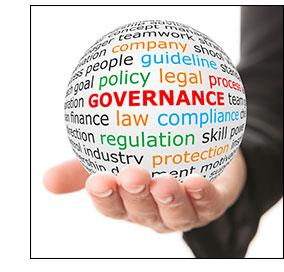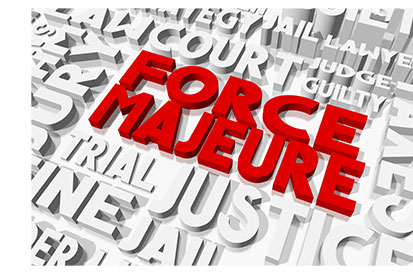 |
THIS ISSUE'S HEADLINES
Importance Of Corporate Governance During The Pandemic
A “Natural Disaster" – The Pandemic’s Impact on Contracts
Considerations and Options for Reforming a Trust
Stay Informed – PLDO COVID-19 Resource Library

IMPORTANCE OF CORPORATE GOVERNANCE DURING THE PANDEMIC
 It is widely recognized that the system of corporate governance is a key approach to preserving and protecting an enterprise and its stakeholders by checks and balances among the board and officers of a corporation. Strong governance policies make it possible to address potential and existing conflicts between the main parties in the organization; i.e., stockholders and directors. When reviewing governance within a corporate setting, we are either employing an agency theory or stakeholder theory. Under modern corporate governance policies, the board is empowered to act with independence so that it has the ability to act quickly when needed, while at the same time, making decisions that are in the best interests of the stakeholders. It is widely recognized that the system of corporate governance is a key approach to preserving and protecting an enterprise and its stakeholders by checks and balances among the board and officers of a corporation. Strong governance policies make it possible to address potential and existing conflicts between the main parties in the organization; i.e., stockholders and directors. When reviewing governance within a corporate setting, we are either employing an agency theory or stakeholder theory. Under modern corporate governance policies, the board is empowered to act with independence so that it has the ability to act quickly when needed, while at the same time, making decisions that are in the best interests of the stakeholders.
Corporations and businesses in general have been devasted by the coronavirus pandemic and the governance system under which they operate will continue to be stretched to meet the challenges and uncertainties. The effectiveness of their corporate governance system and policies will dictate how corporate enterprises survive the financial impact. It will be critical for directors, officers and stakeholders to work cooperatively and in unity to overcome the challenges and the convergence of what is often competing interests. This is a time for trust in managers, owners and stakeholders inside and outside the organization. Survival will require a coming together of all forces in a collaborative manner so as to take full advantage of human intellect and advanced technology to reinvent how businesses operate now and in the future. The strength of the governance system will dictate how outsiders view the overall business operation and financial viability.
Strong corporate governance and a good control system by and among the directors for the benefit of the stakeholders is the key to preserving the financial viability of the enterprise. During these challenging times, which will not end soon, the strength of the governance system and trust that it builds throughout the organization to make appropriate decisions will be the key to survival of many corporate entities. Corporate governance should be viewed as a vital control system to solve difficult problems in normal circumstances, as well as during the pandemic. Studies show that when corporate governance and control systems are transparent, the managers, employees and stakeholders embrace its value and create opportunities for improved performance even in the face of a pandemic.
One significant reaction by businesses that have a solid corporate governance policy was the decision to transition to remote work. Although the individual details for each business may vary depending upon the nature of the business or geography, the directors and leadership of those businesses that reacted quickly to the transition have been able to survive, in part because employees and stakeholders trusted the judgment of management and the directors. Although the transition was necessary, it created the risk of cyberattacks. Those organizations with strong governance policies in cybersecurity that effectively communicated to their staff were key to addressing the challenges, along with improved technology and the right approaches to communication. For more information on corporate governance systems or other business issues, please contact PLDO Managing Principal Gary R. Pannone at 401-824-5100 or email gpannone@pldolaw.com.
[back to top]

A “NATURAL DISASTER" – THE PANDEMIC’S IMPACT ON CONTRACTS
 Early in the COVID-19 pandemic, we wrote about the legal concept of “force majeure” clauses found in some business contracts. A force majeure clause excuses a party from performing its obligations under a contract based upon some unforeseen and serious event such as a war, riot, insurrection, natural disaster, or other act of God. At that time, we suggested that over the course of the pandemic, more and more courts would be asked to relieve a party from having to honor its contractual obligations because the pandemic made it impossible or extremely impractical to uphold its end of a deal. Early in the COVID-19 pandemic, we wrote about the legal concept of “force majeure” clauses found in some business contracts. A force majeure clause excuses a party from performing its obligations under a contract based upon some unforeseen and serious event such as a war, riot, insurrection, natural disaster, or other act of God. At that time, we suggested that over the course of the pandemic, more and more courts would be asked to relieve a party from having to honor its contractual obligations because the pandemic made it impossible or extremely impractical to uphold its end of a deal.
As predicted, many courts have now applied traditional force majeure clauses to the novel coronavirus pandemic and the following trend is starting to appear: in certain cases, courts have expressed a willingness to excuse parties from performing their agreements due to the pandemic if the parties’ contracts contain the right language. For example, if the force majeure clause specifically excuses performance due to a “pandemic,” then the analysis is straightforward and simple. If the pandemic did, in fact, prevent a party from delivering goods or fulfilling its obligations, then that party will be excused from performing. But, unsurprisingly, very few contracts written over the last several years will contain the term “pandemic” as a reason to excuse performance.
Therefore, parties have been seeking to use their existing contract language to argue that the COVID-19 pandemic fits within the scope of that language. In a very interesting case decided last month in New York federal court, a party successfully argued that the pandemic constitutes a “natural disaster,” such that it should have been excused from having to perform. The federal court agreed, noting that “it cannot be seriously disputed that the COVID-19 pandemic is a natural disaster.” This ruling is remarkable because when the attorneys who wrote the contract at issue typed “natural disaster” in that contract, they were most likely thinking of things like typhoons, earthquakes, and hurricanes, not a pandemic.
This decision underscores the importance of checking your contracts carefully and consulting with competent legal counsel who can pursue novel and creative arguments using the existing language in your contracts, even if you or your attorney had not anticipated the outbreak of a worldwide pandemic. It’s possible there is language in your contracts that can nonetheless help you. If you have questions or would like further information, please contact PLDO Partner Brian J. Lamoureux at 401-824-5155 or email bjl@pldolaw.com.
[back to top]

CONSIDERATIONS AND OPTIONS FOR REFORMING A TRUST
 As a beneficiary of a trust or as a trustee, there may be times when it is in the best interest of all parties to reform or even dissolve a trust. However, the ability to reform or dissolve a trust is limited to both the terms of the trust and the state law that applies to the trust. As a beneficiary of a trust or as a trustee, there may be times when it is in the best interest of all parties to reform or even dissolve a trust. However, the ability to reform or dissolve a trust is limited to both the terms of the trust and the state law that applies to the trust.
The first question that should be answered is why does the trust need to be reformed. Sometimes a trust’s terms may be too restrictive and the intended purpose may no longer make sense for the beneficiaries. Alternatively, a poorly drafted trust instrument may create confusion and paralyze the trustee from acting, and thus defeating the purpose of the trust.
The second question that must be answered is whether all parties, beneficiaries and trustees, are in agreement that the trust should be reformed. Any disagreement among beneficiaries and the trustee will affect how the trust is reformed. Depending on the terms of the trust, a trustee may have the authority to reform the trust without approval from all the beneficiaries. However, if there is a dispute among the parties, then reformation may not be possible with or without the courts.
Even if a trust is “irrevocable,” there are, nevertheless, potential options to reform the trust. Three examples are:
- Reformation by Agreement of the Parties. Some states allow reformation of an irrevocable trust on certain substantive issues through a “non-judicial” settlement agreement.
- Dissolution of Small Trusts. Rhode Island allows for dissolution of a trust without court intervention when the trustee is a bank or other financial institution and the trust principal is less than $200,000.
- Petitioning the Court. If there is an issue with the trust that is not addressed directly by the trust terms and the trustee does not have authority to resolve the issue, petitioning the court’s equity jurisdiction may be necessary. Because of the costs and uncertainty of litigating any trust issues, petitioning the court should generally be the last resort.
The available options to resolve and reform a trust will depend on the issue at hand, the trust’s terms, and the state laws that apply. An attorney can help review the terms of the trust and devise a path to reform or dissolve the trust. If you have questions about trusts or other estate planning matters, please contact PLDO Attorney Joshua J. Butera at 401-824-5100 or email jbutera@pldolaw.com.
[back to top]

STAY INFORMED – PLDO COVID-19 RESOURCE LIBRARY
 PLDO’s team of attorneys continue to add updates and advisories regarding the pandemic and its impact on families, businesses and organizations that are accessible in our online Resource Library. Among the featured articles include the following: PLDO’s team of attorneys continue to add updates and advisories regarding the pandemic and its impact on families, businesses and organizations that are accessible in our online Resource Library. Among the featured articles include the following:
If you have questions and would like further information, please contact your PLDO attorney directly in our Rhode Island, Massachusetts or Florida offices or call our toll free number at 866-353-3310 to discuss your legal matter. We are here to help.
[back to top]
|
 |





 Early in the COVID-19 pandemic, we wrote about the legal concept of “force majeure” clauses found in some business contracts. A force majeure clause excuses a party from performing its obligations under a contract based upon some unforeseen and serious event such as a war, riot, insurrection, natural disaster, or other act of God. At that time, we suggested that over the course of the pandemic, more and more courts would be asked to relieve a party from having to honor its contractual obligations because the pandemic made it impossible or extremely impractical to uphold its end of a deal.
Early in the COVID-19 pandemic, we wrote about the legal concept of “force majeure” clauses found in some business contracts. A force majeure clause excuses a party from performing its obligations under a contract based upon some unforeseen and serious event such as a war, riot, insurrection, natural disaster, or other act of God. At that time, we suggested that over the course of the pandemic, more and more courts would be asked to relieve a party from having to honor its contractual obligations because the pandemic made it impossible or extremely impractical to uphold its end of a deal.  As a beneficiary of a trust or as a trustee, there may be times when it is in the best interest of all parties to reform or even dissolve a trust. However, the ability to reform or dissolve a trust is limited to both the terms of the trust and the state law that applies to the trust.
As a beneficiary of a trust or as a trustee, there may be times when it is in the best interest of all parties to reform or even dissolve a trust. However, the ability to reform or dissolve a trust is limited to both the terms of the trust and the state law that applies to the trust. 